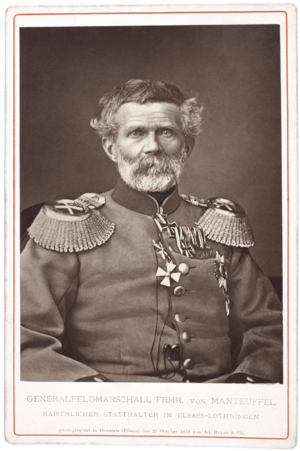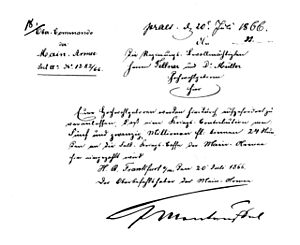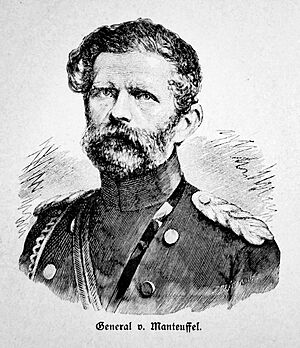Edwin Freiherr von Manteuffel facts for kids
Quick facts for kids
Edwin von Manteuffel
|
|
|---|---|
 |
|
| Born | 24 February 1809 Dresden, Saxony |
| Died | 17 June 1885 (aged 76) Karlsbad, Bohemia |
| Buried |
Frankfurt Main Cemetery
|
| Allegiance | |
| Service/ |
|
| Years of service | 1827–1885 |
| Rank | Generalfeldmarschall |
| Commands held | IX Corps I Corps 1st Army Army of the South 2nd Army Army of Occupation |
| Battles/wars | Second Schleswig War Austro-Prussian War Franco-Prussian War |
| Awards | Grand Cross of the Iron Cross Pour le Mérite Order of the Black Eagle |
| Other work | Imperial Lieutenant of Alsace–Lorraine (1879–85) |
| Signature | |
Edwin Karl Rochus Freiherr von Manteuffel (born February 24, 1809 – died June 17, 1885) was a famous Prussian Generalfeldmarschall (Field Marshal). He is well-known for his important victories during the Franco-Prussian War. He was also the very first Imperial Lieutenant (or Reichsstatthalter) of Alsace–Lorraine from 1879 until he passed away.
Contents
Who Was Edwin von Manteuffel?
Edwin von Manteuffel was born in Dresden. His father was a top judge in Magdeburg. Edwin grew up with his cousin, Otto von Manteuffel, who later became a Prussian statesman.
Starting a Military Career
In 1827, Edwin joined the guards cavalry in Berlin. He became an officer a year later, in 1828. He studied at the War Academy for two years. After that, he worked as an aide-de-camp (a personal assistant) for two different generals.
By 1843, he was promoted to captain. In 1848, he became a major and an aide-de-camp to King Frederick William IV of Prussia. The King trusted him a lot, especially during the revolutionary times in Berlin.
Rising Through the Ranks
Manteuffel became a lieutenant-colonel in 1852. A year later, he was promoted to colonel and led the 5th Uhlans cavalry unit. He was sent on important diplomatic missions to Vienna and St Petersburg.
In 1857, he became a major-general. He was also made chief of the Prussian Military Cabinet. This meant he was a key military advisor to the King. He strongly supported the Prince Regent's plans to make the army stronger.
In 1861, a politician named Karl Twesten criticized him. Manteuffel was promoted to lieutenant-general for the crowning of William I on October 18, 1861.
Key Wars and Commands
The Danish War of 1864
Manteuffel saw active service in the Danish War of 1864. After the war, he was put in charge of both the civilian and military government of Schleswig.
The Austro-Prussian War of 1866
During the Austrian War of 1866, Manteuffel first took control of Holstein. Then, he led a division under Eduard Vogel von Falkenstein in the Hanoverian campaign. In July, he took over from Vogel and commanded the Army of the Main.
Manteuffel's campaign was successful. It ended with his army taking control of Würzburg. For his success, he received the Pour le Mérite award.
After the war, he went on a diplomatic trip to St Petersburg. There, he made sure that Russia agreed to Prussia having control over northern Germany. When he returned, he was given the honorary title of colonel of the 5th Dragoon Regiment. In 1866, he was put in command of the IX (Schleswig-Holstein) Corps.

The Franco-Prussian War of 1870-71
In 1868, Manteuffel returned to active military service. He received the Grand Cross of the Order of the Red Eagle in 1869.
During the Franco-Prussian War of 1870–71, he led the I Corps. He showed great skill in battles like Battle of Borny-Colombey and at battle of Noisseville. In October, he took command of the 1st Army. He won the Battle of Amiens and occupied Rouen.
In January 1871, he commanded the new Army of the South. He led his troops through very cold weather. He managed to cut off Bourbaki's Army of the East. After a battle near Pontarlier, he forced them to cross into Switzerland, where they had to give up their weapons.
For this great victory, he immediately received the Grand Cross of the Iron Cross. After the war ended, he was made a member of the Order of the Black Eagle.
Later Life and Leadership in Alsace-Lorraine
After the Southern Army was no longer needed, Manteuffel commanded the Second Army. From June 1871 to 1873, he was in charge of the German army that stayed in France after the war. He handled this difficult job with great skill.
When the occupation ended, the Emperor promoted Manteuffel to the highest military rank: Field Marshal. He also received a large sum of money. Around the same time, Alexander II of Russia gave him the Order of St. Andrew.
After this, he went on several diplomatic missions. For a while, he was the Governor of Berlin. In 1879, he was appointed Imperial Lieutenant of Alsace–Lorraine. This was a region that Germany had taken from France.
People in Alsace-Lorraine remembered him as a kind and educated man. He tried to bring people together and be fair. When the regional assembly of Alsace-Lorraine first met, he announced his goal. He wanted Alsace-Lorraine to become a fully independent state within the German Empire.
Edwin von Manteuffel died in Carlsbad, Bohemia, in 1885. He was still in office but had not yet achieved his goal of full autonomy for Alsace-Lorraine.
Awards and Recognition
Edwin von Manteuffel received many awards and decorations during his long career:
 Prussia:
Prussia:
- Knight of Honour of the Johanniter Order, November 29, 1848
- Knight's Cross of the Royal House Order of Hohenzollern, 1851; Commander's Cross with Star and Swords, 1864; Grand Commander's Cross with Swords on Ring, June 29, 1865
- Pour le Mérite (military), August 7, 1866; with Oak Leaves, December 24, 1870
- Knight of the Royal Crown Order, 1st Class with Enamel Band of the Red Eagle Order and Oak Leaves, January 19, 1867
- Grand Cross of the Red Eagle, with Oak Leaves, September 18, 1869; with Swords, 1871
- War Commemorative Medal of 1870/71
- Grand Cross of the Iron Cross (1870), March 22, 1871
- Knight of the Black Eagle, June 16, 1871; with Collar, 1872
 Ascanian duchies: Grand Cross of the Order of Albert the Bear, January 25, 1854
Ascanian duchies: Grand Cross of the Order of Albert the Bear, January 25, 1854 Baden: Knight of the Order of Berthold the First, 1877
Baden: Knight of the Order of Berthold the First, 1877 Bavaria:
Bavaria:
- Commander of the Merit Order of St. Michael, 1854
- Grand Cross of the Military Order of Max Joseph, April 11, 1877
- Grand Cross of the Military Merit Order
 Brunswick: Grand Cross of the Order of Henry the Lion, with Swords
Brunswick: Grand Cross of the Order of Henry the Lion, with Swords

 Ernestine duchies: Grand Cross of the Saxe-Ernestine House Order, October 1861
Ernestine duchies: Grand Cross of the Saxe-Ernestine House Order, October 1861 Hesse and by Rhine: Grand Cross of the Merit Order of Philip the Magnanimous, with Swords, February 5, 1861
Hesse and by Rhine: Grand Cross of the Merit Order of Philip the Magnanimous, with Swords, February 5, 1861 Hanover: Commander of the Royal Guelphic Order, 1st Class, 1858
Hanover: Commander of the Royal Guelphic Order, 1st Class, 1858 Mecklenburg:
Mecklenburg:
- Grand Cross of the Wendish Crown, with Golden Crown
- Military Merit Cross, 1st Class (Schwerin)
 Nassau: Grand Cross of the Order of Adolphe of Nassau, with Swords, March 1865
Nassau: Grand Cross of the Order of Adolphe of Nassau, with Swords, March 1865 Oldenburg: Grand Cross of the Order of Duke Peter Friedrich Ludwig, with Golden Crown and Swords, July 29, 1866
Oldenburg: Grand Cross of the Order of Duke Peter Friedrich Ludwig, with Golden Crown and Swords, July 29, 1866 Saxe-Weimar-Eisenach: Grand Cross of the White Falcon, May 21, 1853
Saxe-Weimar-Eisenach: Grand Cross of the White Falcon, May 21, 1853 Saxony: Knight of the Rue Crown, 1871
Saxony: Knight of the Rue Crown, 1871 Schaumburg-Lippe: Military Merit Medal
Schaumburg-Lippe: Military Merit Medal Württemberg: Grand Cross of the Military Merit Order, November 20, 1871
Württemberg: Grand Cross of the Military Merit Order, November 20, 1871 Austria:
Austria:
- Knight of the Iron Crown, 1st Class, 1861
- Grand Cross of the Imperial Order of Leopold, 1863
- Grand Cross of the Royal Hungarian Order of St. Stephen, 1872
 France: Grand Officer of the Legion of Honour
France: Grand Officer of the Legion of Honour Italy: Knight of the Annunciation, October 20, 1875
Italy: Knight of the Annunciation, October 20, 1875 Russia:
Russia:
- Knight of St. George, 3rd Class, December 27, 1870
- Knight of St. Alexander Nevsky, in Diamonds
- Knight of St. Vladimir, 1st Class
- Knight of St. Andrew
 Sweden: Knight of the Sword
Sweden: Knight of the Sword
See also
 In Spanish: Edwin von Manteuffel para niños
In Spanish: Edwin von Manteuffel para niños
 | Janet Taylor Pickett |
 | Synthia Saint James |
 | Howardena Pindell |
 | Faith Ringgold |


